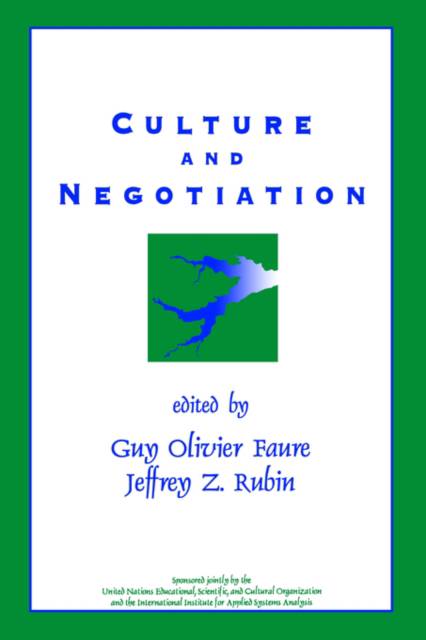
- Afhalen na 1 uur in een winkel met voorraad
- Gratis thuislevering in België vanaf € 30
- Ruim aanbod met 7 miljoen producten
- Afhalen na 1 uur in een winkel met voorraad
- Gratis thuislevering in België vanaf € 30
- Ruim aanbod met 7 miljoen producten
Zoeken
€ 279,45
+ 558 punten
Omschrijving
Sponsored jointly by the United Nations Educational, Scientific, and Cultural Organization and the International Institute for Applied Systems Analysis "It′s much too late but this is the book we should have had in Paris during the five years effort to get a political settlement of the Vietnam War. . . . Thought provoking." --Indochina Chronology "An important contribution to a better understanding of international relations . . . with reflective discussions as well as thorough case studies." --Indian Express Culture--along with many other variables--often impacts international negotiations. Culture and Negotiation offers a unique contribution by focusing on the distinctive impact of culture, both in creating unexpected opportunities for dispute settlement and in imposing obstacles to agreement. Separated into three sections, part I presents expert views on the nature and limits of culture′s influence on negotiation. Part II comprises the core of the book, and contains a wealth of case studies and analyses of international disputes regarding water resources. Each case asks the following key questions: What are the different cultural components that made a difference in the outcome? How did culture play a role in the negotiation process? What are some specific illustrations of culture′s contributing role, both to the dispute and to the ways in which it was handled? Part III includes implications for practitioners and policymakers, along with new directions for future studies. Culture and Negotiation is an essential resource for international relations practitioners in both the private and public sectors, as well as scholars and researchers interested in either culture or the theory and practice of negotiation and dispute resolution.
Specificaties
Betrokkenen
- Auteur(s):
- Uitgeverij:
Inhoud
- Aantal bladzijden:
- 280
- Taal:
- Engels
Eigenschappen
- Productcode (EAN):
- 9780803953710
- Verschijningsdatum:
- 1/09/1993
- Uitvoering:
- Paperback
- Formaat:
- Trade paperback (VS)
- Afmetingen:
- 153 mm x 219 mm
- Gewicht:
- 449 g

Alleen bij Standaard Boekhandel
+ 558 punten op je klantenkaart van Standaard Boekhandel
Beoordelingen
We publiceren alleen reviews die voldoen aan de voorwaarden voor reviews. Bekijk onze voorwaarden voor reviews.








